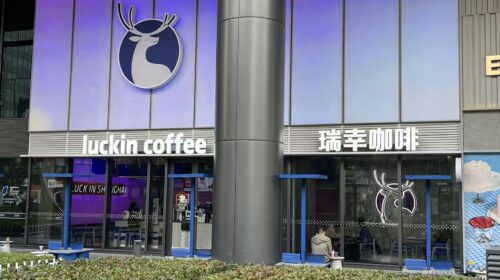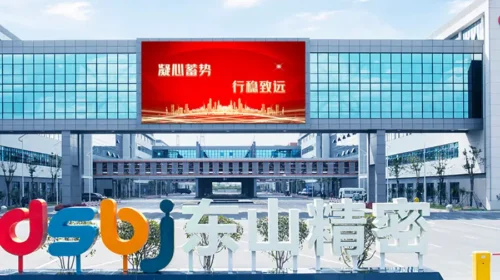Pop Mart scores big overseas hit with craze for cute toys

After a rapid expansion, the retailer of blind-box toys can now boast a bigger market value than some Hong Kong blue chips such as Chow Tai Fook, Li Ning and Haidilao
Key Takeaways:
- Pop Mart’s overseas sales soared more than four times in the third quarter, far exceeding market expectations
- Riding on the good news, company founder Wang Ning launched a rights issue that raised more than HK$1.5 billion
By Fai Pui
When Forbes issued its latest list of China’s best corporate leaders, the line-up featured a fresh-faced businessman who has made a name for himself as a toy tycoon.
Wang Ning is the founder of Pop Mart International Group Ltd. (9992.HK), a fast-growing company that sells cute and collectible figurines in blind boxes. At 37, Wang is the youngest self-made entrepreneur to have made it onto the magazine’s list of high-performing corporate bosses.
The Forbes accolade in July this year comes after the toy retailer achieved standout success on international markets in the face of a challenging retail economy in China.
Pop Mart’s share price has more than tripled this year, giving the company a market value of more than HK$100 billion ($12.9 billion) at one point. The seller of toys packaged in mystery boxes was worth around HK$95 billion as of last Friday, more than some Hong Kong blue chip stocks such asjewelry retailer Chow Tai Fook (1929.HK), hotpot chain Haidilao (6862.HK) or Wharf Real Estate (1997.HK), owner of Hong Kong’s Times Square and Harbour City shopping malls. As holder of nearly 48% of the firm’s shares, Wang has seen his net worth surge to almost HK$50 billion.
Many consumer goods companies have been struggling through a retail downturn in China, but Pop Mart has defied the gloom, releasing a surprisingly strong business update earlier in October. Pop Mart’s overall revenue more than doubled in the third quarter from the same period a year earlier, logging a rise of 120% to 125% on surging international sales. The company said revenues derived from Hong Kong, Macau, Taiwan and overseas markets rose by a whopping 440% to 445%, while turnover on the Chinese mainland jumped by 55% to 60%.
Reviewing the stellar figures, analysts said the company was on track to beat its earlier guidance for annual earnings. Nomura even declared that Pop Mart was China’s best retail stock. As eager investors piled in, Pop Mart’s shares opened 13% higher on the day after the figures came out, gaining 18.5% in the session to reach HK$75.2. The price achieved a 15-month high of HK$78 the following day, taking the firm’s market valuation above the HK$100 billion mark.
UBS predicted that Pop Mart’s share price could keep climbing as the fourth quarter is known to be a peak purchasing season for overseas markets. The investment bank gave the stock a “buy” rating, raising its target price from HK$75.5 to HK$86.5. CICC also raised its target by 43% to HK$82, citing scope for the brand to open new stores to meet robust demand in China and other markets. Joining in the bullish mood, Morgan Stanley raised its target from HK$69 to HK$81 based on further growth momentum for Pop Mart’s quirky creations.
Amid the buzz around Pop Mart, talk began to circulate in the market that Wang had ordered the issuance of a new set of shares. A large allocation at HK$71.98 per share, a discount of about 5% from the previous trading day, was reported before last Friday’s market open, with a total value of about HK$1.56 billion. Pop Mart stock plunged by around 7% that day, closing slightly below the share allotment price.
The company apparently had little difficulty placing the shares, even at a relatively small discount, said Dickie Wong, executive director of research at Kingston Securities. The limited slippage in the share price indicates that the market was able to absorb the issuance, he said.
Celebrity effect
The buying frenzy this year was largely driven by one hit product, the “Labubu” doll from Pop Mart’s monster series that counts global pop stars among its fans. The devilish doll features a furry body, large pointy ears, a cartoonish face and nine sharp teeth. The Thai singer Lisa, one of the members of the K-pop group BlackPink, often posts about Labubu dolls, charms, and other products on her social media accounts, helping to turn the toy into a global sensation.
The dolls are particularly sought after in Lisa’s homeland, where a Labubu figure with an original retail price of HK$100 can be sold for about HK$2,000.
Meanwhile, the company has been actively expanding its international footprint, first targeting Southeast Asia as being receptive to cute collectibles. The brand entered Singapore two years ago, then opened stores in Malaysia and set up shop in Thailand in May 2023. This February Los Angeles was added to the stores list, followed by Vietnam in May and an outlet on London’s Oxford Street in June. By the end of June, the company’s network outside of mainland China had grown to encompass 92 stores in Hong Kong, Macau, Taiwan and other markets, plus 162 automated vending points.
Pop Mart went public in Hong Kong in December 2020 with an offer price of HK$38.5. The stock more than doubled at one point in the debut trading session, later going on to peak at a lofty HK$107.6 before succumbing to a general stock market downturn.
But the runaway success of Pop Mart’s pricey playthings has drawn critical scrutiny from the Chinese authorities, concerned about the potential for reckless or harmful consumption habits.
A few weeks after the firm’s listing, the state’s Xinhua News Agency published an article criticizing the craze for blind boxes, whose exact contents are unknown to prospective buyers. An opinion piece described blind boxes as part of an abnormal consumption trend based on a gambling mentality. It warned that consumers may become easily addicted, emptying their wallets every month in their zeal to acquire the boxes. The article also called explicitly for tighter regulation of the business.
The critique immediately stoked fears of a crackdown, leading to a sell-off in Pop Mart’s shares.
The risk of future restrictions on blind boxes is one hazard of investing in the company right now, according to Kenny Wen, head of investment strategy at KGI Asia. The second risk is the high market price, with the company’s historical price-to-earnings (P/E) ratio at more than 80 times and the forward P/E ratio at 37 times, he said.
The high base may be hard to exceed in the future, even with continued strong results, and the share price could slip unless the company comes up with more winning products, Wen said.
Therefore, investors may want to think twice before buying into the brand at a high price point.
To subscribe to Bamboo Works weekly free newsletter, click here




